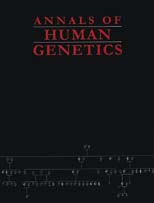Crossref Citations
This article has been cited by the following publications. This list is generated based on data provided by
Crossref.
Ruan, Jian
Schmugge, Markus
Clemetson, Kenneth J.
Cazes, Eric
Combrie, Robert
Bourre, François
and
Nurden, Alan T.
1999.
Homozygous Cys542→Arg substitution in GPIIIa in a Swiss patient with type I Glanzmann's thrombasthenia.
British Journal of Haematology,
Vol. 105,
Issue. 2,
p.
523.
Niida, Yo
Lawrence-Smith, Nicole
Banwell, Ashleigh
Hammer, Erica
Lewis, Janine
Beauchamp, Roberta L.
Sims, Katherine
Ramesh, Vijaya
and
Ozelius, Laurie
1999.
Analysis of bothTSC1 andTSC2 for germline mutations in 126 unrelated patients with tuberous sclerosis.
Human Mutation,
Vol. 14,
Issue. 5,
p.
412.
Ruan, Jian
Schmugge, Markus
Clemetson, Kenneth J.
Cazes, Eric
Combrie, Robert
Bourre, Francois
and
Nurden, Alan T.
1999.
Homozygous Cys542Arg substitution in GPIIIa in a Swiss patient with type I Glanzmann's thrombasthenia.
British Journal of Haematology,
Vol. 105,
Issue. 2,
p.
523.
B�nit, Paule
Kara-Mostefa, Ali
Hadj-Rabia, Smail
Munnich, Arnold
and
Bonnefont, Jean-Paul
1999.
Protein truncation test for screening hamartin gene mutations and report of new disease-causing mutations.
Human Mutation,
Vol. 14,
Issue. 5,
p.
428.
Jones, Alistair C.
Shyamsundar, Magitha M.
Thomas, Meinir W.
Maynard, Julie
Idziaszczyk, Shelley
Tomkins, Susan
Sampson, Julian R.
and
Cheadle, Jeremy P.
1999.
Comprehensive Mutation Analysis of TSC1 and TSC2—and Phenotypic Correlations in 150 Families with Tuberous Sclerosis.
The American Journal of Human Genetics,
Vol. 64,
Issue. 5,
p.
1305.
Onda, Hiroaki
Lueck, Andreas
Marks, Peter W.
Warren, Henry B.
and
Kwiatkowski, David J.
1999.
Tsc2+/– mice develop tumors in multiple sites that express gelsolin and are influenced by genetic background.
Journal of Clinical Investigation,
Vol. 104,
Issue. 6,
p.
687.
Osborne, JP
Jones, AC
Burley, MW
Jeganathan, D
Young, J
O'Callaghan, FJ
Sampson, JR
and
Povey, S
2000.
Non-penetrance in tuberous sclerosis.
The Lancet,
Vol. 355,
Issue. 9216,
p.
1698.
Yamashita, Yokihiko
Ono, Jiro
Okada, Shintaro
Wataya-Kaneda, Mari
Yoshikawa, Kunihiko
Nishizawa, Masae
Hirayama, Youko
Kobayashi, Etuko
Seyama, Kuniaki
and
Hino, Okio
2000.
Analysis of all exons oftsc1 andtsc2 genes for germline mutations in Japanese patients with tuberous sclerosis: Report of 10 mutations.
American Journal of Medical Genetics,
Vol. 90,
Issue. 2,
p.
123.
B�nit, Paule
Kara-Mostefa, Ali
Berthelon, Monique
Sengmany, Kamchan
Munnich, Arnold
and
Bonnefont, Jean-Paul
2000.
Mutation analysis of the hamartin gene using denaturing high performance liquid chromatography.
Human Mutation,
Vol. 16,
Issue. 5,
p.
417.
Dabora, Sandra L.
Jozwiak, Sergiusz
Franz, David Neal
Roberts, Penelope S.
Nieto, Andres
Chung, Joon
Choy, Yew-Sing
Reeve, Mary Pat
Thiele, Elizabeth
Egelhoff, John C.
Kasprzyk-Obara, Jolanta
Domanska-Pakiela, Dorota
and
Kwiatkowski, David J.
2001.
Mutational Analysis in a Cohort of 224 Tuberous Sclerosis Patients Indicates Increased Severity of TSC2, Compared with TSC1, Disease in Multiple Organs.
The American Journal of Human Genetics,
Vol. 68,
Issue. 1,
p.
64.
Bénit, Paule
Bonnefont, Jean‐Paul
Kara Mostefa, Ali
Francannet, Christine
Munnich, Arnold
and
Ray, Pierre F.
2001.
Denaturing high‐performance liquid chromatography (DHPLC)‐based prenatal diagnosis for tuberous sclerosis.
Prenatal Diagnosis,
Vol. 21,
Issue. 4,
p.
279.
Goedbloed, Miriam A
Nellist, Mark
Verhaaf, Brenda
Reuser, Arnold JJ
Lindhout, Dick
Sunde, Lone
Verhoef, Senno
Halley, Dicky JJ
and
van den Ouweland, Ans MW
2001.
Analysis of TSC2 stop codon variants found in tuberous sclerosis patients.
European Journal of Human Genetics,
Vol. 9,
Issue. 11,
p.
823.
Wienecke, Ralf
2001.
Molekularmedizinische Grundlagen von hereditären Tumorerkrankungen.
p.
235.
Yamamoto, Toshiyuki
Pipo, Judy R.
Feng, Jian-Hua
Takeda, Hiromasa
Nanba, Eiji
Ninomiya, Haruaki
and
Ohno, Kousaku
2002.
Novel TSC1 and TSC2 mutations in Japanese patients with tuberous sclerosis complex.
Brain and Development,
Vol. 24,
Issue. 4,
p.
227.
Sansal, Isabelle
and
Sellers, William R.
2004.
The Biology and Clinical Relevance of the PTEN Tumor Suppressor Pathway.
Journal of Clinical Oncology,
Vol. 22,
Issue. 14,
p.
2954.
Rendtorff, Nanna D.
Bjerregaard, Bolette
Frödin, Morten
Kjaergaard, Susanne
Hove, Hanne
Skovby, Flemming
Brøndum-Nielsen, Karen
and
Schwartz, Marianne
2005.
Analysis of 65 tuberous sclerosis complex (TSC) patients byTSC2DGGE,TSC1/TSC2MLPA, andTSC1long-range PCR sequencing, and report of 28 novel mutations.
Human Mutation,
Vol. 26,
Issue. 4,
p.
374.
Milunsky, Aubrey
Shim, Sung Han
Ito, Masamichi
Jaekle, Ronald K.
Bassett, Lori L.
Brumund, Michael R.
and
Milunsky, Jeff M.
2005.
Precise prenatal diagnosis of tuberous sclerosis by sequencing the TSC2 gene.
Prenatal Diagnosis,
Vol. 25,
Issue. 7,
p.
582.
2006.
Atlas of Genetic Diagnosis and Counseling.
p.
997.
Curatolo, Paolo
and
Bombardieri, Roberta
2007.
Malformations of the Nervous System.
Vol. 87,
Issue. ,
p.
129.
Nellist, Mark
van den Heuvel, Diana
Schluep, Diane
Exalto, Carla
Goedbloed, Miriam
Maat-Kievit, Anneke
van Essen, Ton
van Spaendonck-Zwarts, Karin
Jansen, Floor
Helderman, Paula
Bartalini, Gabriella
Vierimaa, Outi
Penttinen, Maila
van den Ende, Jenneke
van den Ouweland, Ans
and
Halley, Dicky
2009.
Missense mutations to the TSC1 gene cause tuberous sclerosis complex.
European Journal of Human Genetics,
Vol. 17,
Issue. 3,
p.
319.




